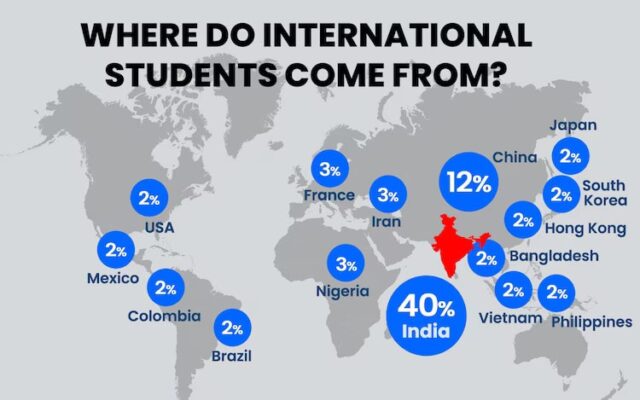
Marc Miller, Canada’s Immigration Minister, has announced plans to probe the possibility of implementing a cap on the number of international students in the North American country. And the measures could come into effect very soon.
The steps to limit the number of international students could come as soon as in the first and second quarters of this year, Marc Miller hinted on Saturday. He also batted for a strong mechanism for verifying offer letters and ensuring the financial capability of people when they come to Canada.
This comes amid concerns over the growing number of international students in Canada and pressure on infrastructure, including housing. In fact, Canada is facing an unprecedented shortfall in housing units.
Students from India form a big chunk of international students in Canada. Indians also use the study visa route to immigrate to Canada. If a cap is put on study visas, it will impact the plans of thousands of Indians planning to settle in Canada.
“That volume is disconcerting,” Miller said, about the number of international students in Canada. “It’s really a system that has gotten out of control,” CTV news quoted the Canadian minister as saying.
Miller acknowledged the need for a discussion between the federal and provincial governments to handle the increasing number of overseas students.
The federal government of Canada has faced criticism over the rising number of immigrants. The concern stems mostly over a shortage in housing units.
Two years ago, The Canadian Press received internal memos that warned that ambitious immigration targets could undermine housing affordability. The government’s plan to welcome 485,000 immigrants in 2024 and 500,000 in 2025 and 2026 has stirred controversy about the impact on housing.
In 2023, Canada planned to welcome 500,000 permanent residents and 900,000 international students, aiming for economic growth. However, a housing shortage, with a shortfall of 345,000 units and high interest rates posed challenges.
The surge in student migration to Canada is not solely driven by education but by the ease of obtaining permanent residency through the student visa route.
Private colleges in Canada are easy to get into. They, at times, charge international students almost three times the fees they charge from locals, who mostly study in public universities.
Indians constitute a significant portion of international students in Canada, with 40% of the total in 2022.
CANADA TO VERIFY OFFER LETTERS TO INTERNATIONAL STUDENTS
Temporary residents, such as international students and migrant labourers, get into the immigration process with permanent residency (PR) and citizenship.
More than 300,000 temporary residents arrived in Canada during the third quarter of the previous year.
Minister Miller on Saturday hinted that the probable steps could be introduced in the first and second quarters of this year to limit the number of international students, to alleviate housing demand.
“We need to be doing our jobs and making sure that we have a system that actually makes sure people have a financial capability to come to Canada, that we’re actually verifying offer letters,” Miller said.
Minister Miller stressed the importance of analyzing federal-level data before going into specifics at the provincial level.
He underlined the importance of a strong mechanism for verifying offer letters, for both workers and international students, and ensuring the financial capability of people when they come to Canada.
Canada had in December 2023 doubled the cost-of-living requirement for international students. The increase in the cost-of-living requirement increased the burden on an individual by over Rs 6 lakh.
Reports said in December that Canada would cap the number of study visa for international students in 2024.
A cap, if enacted, would not be a one-size-fits-all answer to Canada’s housing crisis.
Minister Miller recognised that housing is only one factor to consider when determining immigration targets. He emphasised the importance of reducing the average age of the workforce.
While declining to provide exact statistics, Miller said that a cap on overseas students was being considered, with ongoing negotiations taking place around bargaining tables and taking into account academic institutions’ financial needs.
Paying higher fees, international students are sustaining several private universities in Canada. International students are also important for Canada’s gig economy. So, Canada will have to take measured steps when it comes to checking the flow of international students.




































